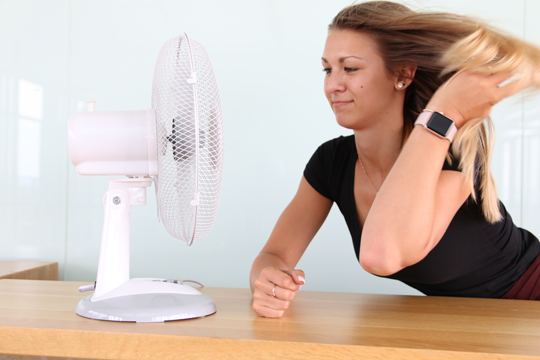Withstanding the heat
Freiburg, Aug 02, 2018
The heat has taken over the University and the University Medical Center Freiburg. It has become increasingly difficult for staff members to work normally with temperatures hovering around 35 degrees. Eva Opitz asked Dr. Daniel Steinmann, Head of the Medical Service Department, about how employees can withstand the heat.

Cool breeze: A fan can help combat the high temperatures at the office. Photo: Sandra Meyndt
Dr. Steinmann, the room temperature is on the rise. How often have you been called lately?
Daniel Steinmann: It is safe to say I have been called upon as an in-house doctor at least once a day from a variety of workplaces. It happens when the room temperature starts to hover around 35 degrees.
Why do people call you?
Employees ask what they can do to lower the temperature. Sometimes there are discussions about whether it makes sense to ventilate only in the morning or keep the windows open all day long. And it also raises the question of whether you can work at such temperatures at all.
How quickly is performance negatively affected by temperatures around 35 degrees?
It is hard to say because everyone reacts differently to the heat. But there are indeed requirements as clearly stated by the Federal Institute for Occupational Safety and Health: You can no longer work when it is above 35 degrees in a room that is no longer suitable to perform work. At a room temperature that reaches 30 degrees performance is certainly limited.
What effect does it have?
For example, an employee may request that the temperature be lowered or an alternative be provided. However, it is not the employee’s responsibility, but rather that of the company or the appropriate manager. Before you can continue working, the temperature must be kept below 35 degrees. It is not an option. It is a must. Many employees and executives are unaware of this regulation and they continue to work nonetheless.

“Before you can work, the temperature has to be below 35 degrees”: The in-house doctor Daniel Steinmann says it is the employers’ responsibility. Photo: University Medical Center Freiburg
What do you think of the general advice: drink a lot, eat light food, wear appropriate clothing?
It is very important. The dress code should be relaxed, for instance no ties. But men are often limited in their choices. As a doctor and manager I can’t show up in shorts, flip-flops and a t-shirt. It is important for those employees who arrive early in the morning to air out the room and to close the windows around 8 am. That way you can vastly decrease the room temperature.
What other measures can people take to combat the heat?
It is important for employees to enjoy flexible work hours. Meaning they can work in the early morning hours and leave early. An alternative is part time or working from home if the temperature in the home office is much lower.
What else needs to be considered in the face of rising temperatures over longer periods of time?
That is a very good question. What stance should we take in the coming years? Can you imagine a lot more high temperature days or do you simply ignore the trend and carry on as before? The other question is who gets an air conditioner and under which conditions? It is clear that executives or staff members who deal with the public cannot work without the appropriate clothing, such as when they receive guests. It is feasible that all employees such as those working at the University Medical Center or in many corporate environments would get free mineral water, for instance.
Help against the heat
The staff council and in-house medical services at the University of Freiburg recommend a list of measures that should help employees deal with the heat at the workplace.
What to do with stress-induced heat at the workplace?
For more information about room temperature during the summer heat wave

